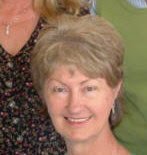The Pikes Peak Writers Conference was fabulous. It's incredibly motivating to hear powerhouse authors like Jim Butcher (Dresden Files) and Robert Crais (The Watchman, among others) talk about their struggle to get where they are, their failures and successes, their rejection letters! I came home feeling like a writer. In fact, I've been plowing through revisions the last two days and finally have a semi-final draft of my new middle grade novel done and ready to go to my great critique group (a topic for another post).
During the awards ceremony, I sat with Mary Jo Putney which was truly an honor. She and her husband are both delightful. I walked away with my 2nd place award and an autographed copy of her new book, The Marriage Spell. What a magical night!
There were so many inspiring and informational workshops, it'd be impossible to name them all. Every writer should treat themselves to conferences such as these. They feed the soul and keep you going between rejection letters -- on your way to the first book offer.
Wednesday, April 25, 2007
Friday, April 13, 2007
the heart of my story
Something author Randy Powell talked about at our 2006 RMC-SCBWI summer retreat sticks with me as I write, revise or explore new topics. He said that it's important to clearly identify the heart of your story. If you don't really know what your story is about, how can your reader know? And it's amazing how you can get immersed in a manuscript, creatively describing breathtaking scenery and invent gripping dialogue, but stumble when asked, "What is your story about?"
I've found that signing up to pitch to an agent or editor is a good way to test whether you're in touch with your own story. I believe the heart of your story should come through in your log line, or at least within the first couple of sentences as you begin to talk about your manuscript. In fact, I find it helpful to write a few log lines as I move forward in my writing just to be sure my original theme hasn't gotten lost somewhere in the dense, frost-covered forest. It's possible that my original theme has changed as my story develops, but it's something I need to be aware of and be okay with. I'm in the process of preparing for my pitch at the PPW conference next week. I'm going through several versions of log lines and first sentences to be sure I can clearly verbalize what I see as the heart of my new middle grade novel.
I've found that signing up to pitch to an agent or editor is a good way to test whether you're in touch with your own story. I believe the heart of your story should come through in your log line, or at least within the first couple of sentences as you begin to talk about your manuscript. In fact, I find it helpful to write a few log lines as I move forward in my writing just to be sure my original theme hasn't gotten lost somewhere in the dense, frost-covered forest. It's possible that my original theme has changed as my story develops, but it's something I need to be aware of and be okay with. I'm in the process of preparing for my pitch at the PPW conference next week. I'm going through several versions of log lines and first sentences to be sure I can clearly verbalize what I see as the heart of my new middle grade novel.
Friday, April 6, 2007
Sometimes I wonder where my head is. After hearing a great presentation from an editor at the SCBWI spring conference, and reading her submission guidelines which clearly state that a conference participant should indicate on the front of the envelope that she attended the conference in order to steer her manuscript away from the slush pile, I sent my submission without that notation. I agonized over what to do, then decided to resend it with an explanation and my apologies. I figure she'll think I'm either persistant, high-maintenance, or totally losing it -- two of which apply (I'm really not high maintenance.).
I've been immersed in revisions which is, in my opinion, the hardest part of writing. The presentations by Todd Mitchell and Laura Resau at the spring conference were timely and excellent. As one of our esteemed RA's said, sometimes you hear the same thing again and again, but until you're actually at that stage in your own writing, it doesn't resonate. (Thanks, Becky). That's one reason it's important to keep going to workshops, conferences, presentations, anything to move your work along. Now, back to revisions.
I've been immersed in revisions which is, in my opinion, the hardest part of writing. The presentations by Todd Mitchell and Laura Resau at the spring conference were timely and excellent. As one of our esteemed RA's said, sometimes you hear the same thing again and again, but until you're actually at that stage in your own writing, it doesn't resonate. (Thanks, Becky). That's one reason it's important to keep going to workshops, conferences, presentations, anything to move your work along. Now, back to revisions.
Thursday, April 5, 2007
My First Blog
Okay, I've been threatening to start blogging but I decided to wait until I figured out what blogging was. After attending the Rocky Mountain Chapter's spring SCBWI conference and listening to a wonderful presentation by Olgy Gary, I'm now actually blogging, although I'm still not sure what it is. I'm gearing up for the Pikes Peak Writers conference coming up in a couple of weeks where I'm excited to receive my third Paul Gillette Contest award. I also look forward to reading a few pages from my new middle grade manuscript and pitching to an editor. And I totally look forward to seeing all my writer friends there.
Subscribe to:
Comments (Atom)
